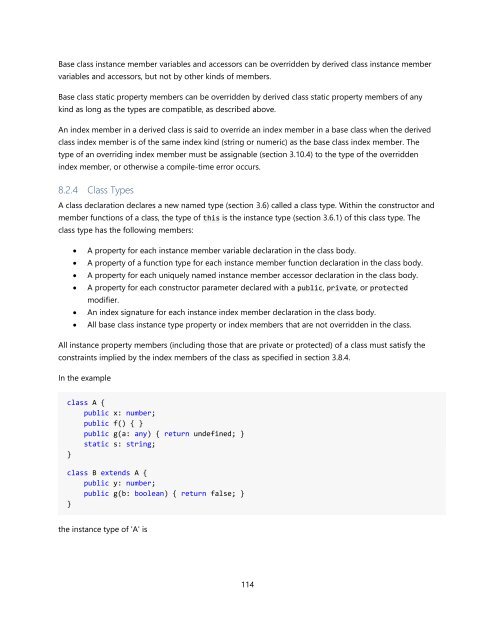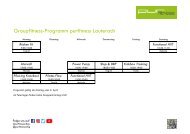TypeScript Language Specification v1.5
TypeScript Language Specification v1.5
TypeScript Language Specification v1.5
You also want an ePaper? Increase the reach of your titles
YUMPU automatically turns print PDFs into web optimized ePapers that Google loves.
Base class instance member variables and accessors can be overridden by derived class instance member<br />
variables and accessors, but not by other kinds of members.<br />
Base class static property members can be overridden by derived class static property members of any<br />
kind as long as the types are compatible, as described above.<br />
An index member in a derived class is said to override an index member in a base class when the derived<br />
class index member is of the same index kind (string or numeric) as the base class index member. The<br />
type of an overriding index member must be assignable (section 3.10.4) to the type of the overridden<br />
index member, or otherwise a compile-time error occurs.<br />
8.2.4 Class Types<br />
A class declaration declares a new named type (section 3.6) called a class type. Within the constructor and<br />
member functions of a class, the type of this is the instance type (section 3.6.1) of this class type. The<br />
class type has the following members:<br />
<br />
<br />
<br />
<br />
<br />
<br />
A property for each instance member variable declaration in the class body.<br />
A property of a function type for each instance member function declaration in the class body.<br />
A property for each uniquely named instance member accessor declaration in the class body.<br />
A property for each constructor parameter declared with a public, private, or protected<br />
modifier.<br />
An index signature for each instance index member declaration in the class body.<br />
All base class instance type property or index members that are not overridden in the class.<br />
All instance property members (including those that are private or protected) of a class must satisfy the<br />
constraints implied by the index members of the class as specified in section 3.8.4.<br />
In the example<br />
class A {<br />
public x: number;<br />
public f() { }<br />
public g(a: any) { return undefined; }<br />
static s: string;<br />
}<br />
class B extends A {<br />
public y: number;<br />
public g(b: boolean) { return false; }<br />
}<br />
the instance type of 'A' is<br />
114


















